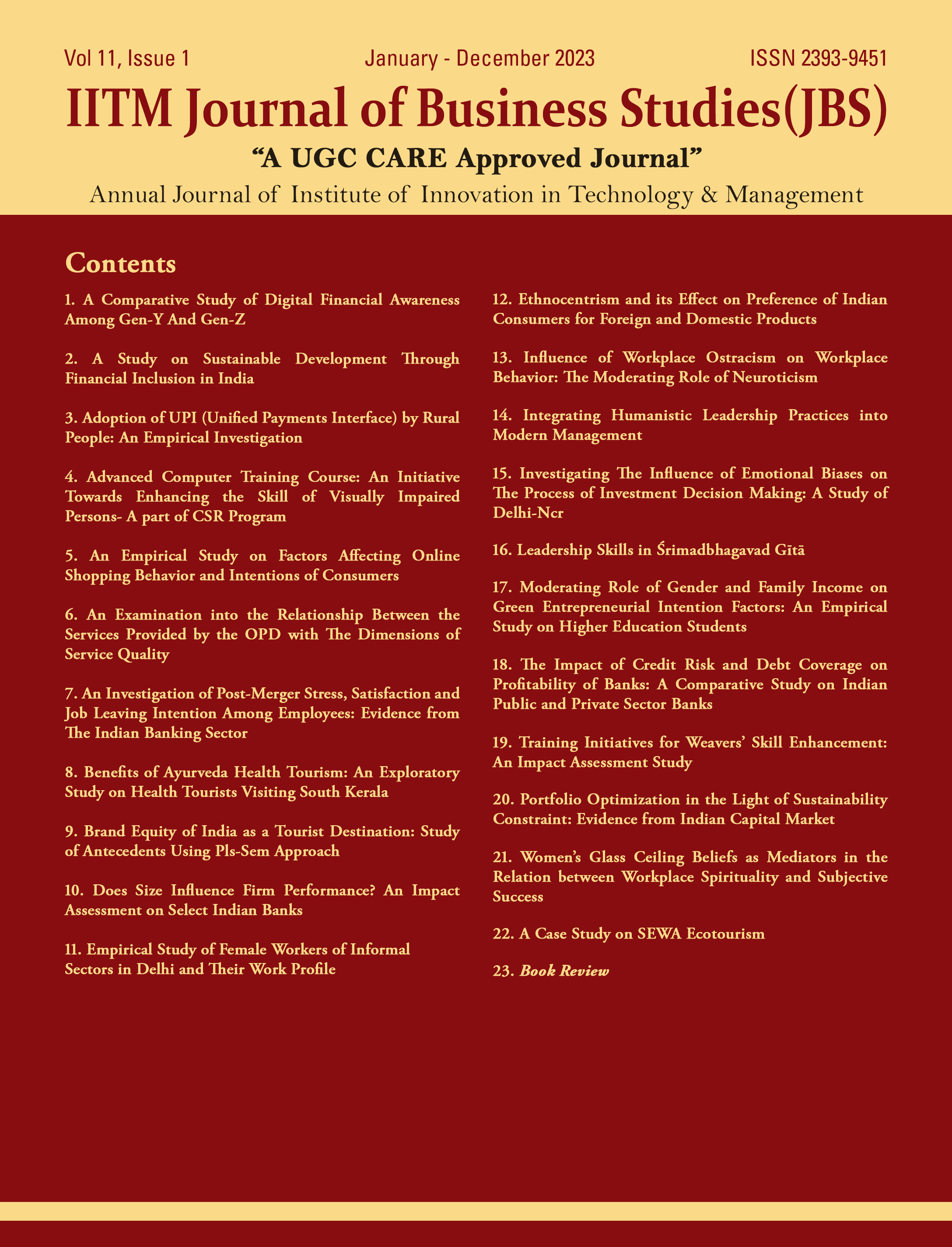A STUDY ON DEPLOYMENT OF DIFFERENTLY-ABLED PERSONS IN INDIAN HOSPITALITY INDUSTRY IN PURVIEW OF SERVQUAL MODEL
Keywords:
SERVQUAL, RPWD, Consumer satisfactionAbstract
The consumer is a crucial factor in the promotion of any business. This paper is about consumers’ perception and intention on the deployment of differently-abled persons (DAP) in the Indian hospitality industry. The modified SERVQUAL model was used to study the consumers’ concern about accepting the services of DAP in the hospitality sector. Data was collected through a structured questionnaire in Google form among consumers all over the country, which was measured on a five point Likert scale to find out their choice of the inclusive Indian hospitality industry. A quantitative analysis reveals that consumers all over India have a positive attitude towards DAP staff, but neither they assuring of return business nor are they empathetic towards them. This work identified that the management of such organizations needs to be more strategic and adaptable. This paper represents original research that encourages hospitality businesses to employ DAP.
References
Akbaba, A. (2006). Measuring service quality in the hotel industry: A study in a business hotel in Turkey. International Journal of Hospitality Management, 25(2), 170–192. https://doi.org/10.1016/j. ijhm.2005.08.006
Bartram, T., Cavanagh, J., Sim, S., Pariona-Cabrera, P., & Meacham, H. (2019). Going the Extra Mile: Managers and Supervisors as Moral Agents for Workers with Disability at Two Social Enterprises. Relations Industrielles / Industrial Relations, 73(4), 728–752. https://doi.org/10.7202/1056975ar 3. Bengisu, M., & Balta, S. (2011). Employment of the workforce with disabilities in the hospitality industry. Journal of Sustainable Tourism, 19(1), 35–57. https://doi.org/10.1080/09669582.2010.499172 4. Bonaccio, S., Connelly, C. E., Gellatly, I. R., Jetha, A., & Martin Ginis, K. A. (2020). The Participation of People with Disabilities in the Workplace Across the Employment Cycle: Employer Concerns and Research Evidence. Journal of Business and Psychology, 35(2), 135–158. https://doi.org/10.1007/s10869-018-9602-5 5. Eubanks, J. C., Moore, A. G., Fishwick, P. A., & McMahan, R. P. (2021). A Preliminary Embodiment Short Questionnaire. Frontiers in Virtual Reality, 2(April), 1–15. https://doi.org/10.3389/frvir.2021.647896 6. Groschl, S. (2011). Employment barriers for persons with disabilities in the hotel industry: A reality check. International CHRIE Conference, 7. http://scholarworks.umass.edu/refereed/ICHRIE_2011/Thursday/5/ 7. Gröschl, S. (2013). Presumed Incapable: Exploring the Validity of Negative Judgments about Persons with Disabilities and Their Employability in Hotel Operations. Cornell Hospitality Quarterly, 54(2), 114–123. https://doi.org/10.1177/1938965512453082
Grujičić, D., Ivanović, I., Jović, J., & Dorić, V. (2014). Customer perception of service quality in public transport. Transport, 29(3), 285–295. https://doi.org/10.3846/16484142.2014.951685 9. Hair, J., Black, W., Babin, B., & Anderson, R. (2010). Multivariate data analysis (7th ed.). Prentice Hall. 10. Houtenville, A., & Kalargyrou, V. (2012). People with disabilities: Employers’ perspectives on recruitment practices, strategies, and challenges in leisure and hospitality. Cornell Hospitality Quarterly, 53(1), 40–52. https://doi.org/10.1177/1938965511424151
Hui, R. T. yin, Tsui, B., & Tavitiyaman, P. (2020). Disability employment in the hotel industry: Evidence from the employees’ perspective. Journal of Human Resources in Hospitality and Tourism, 0(0), 1–19. https://doi.org/10.1080/15332845.2020.1763757
Kalargyrou, V., & Volis, A. A. (2014). Disability Inclusion Initiatives in the Hospitality Industry: An Exploratory Study of Industry Leaders. Journal of Human Resources in Hospitality and Tourism, 13(4), 430–454. https://doi.org/10.1080/15332845.2014.903152
Kalargyrou, V., Barber, N. A., & Kuo, P. J. (2018). The impact of disability on guests’ perceptions of service quality delivery in the hospitality industry. International Journal of Contemporary Hospitality Management, 30(12), 3632–3655. https://doi.org/10.1108/IJCHM-06-2017-0362
Kalargyrou, V., Trivellas, P., & Sigala, M. (2020). Guests’ stereotyping and quality evaluations of service delivered by employees with disabilities: does service failure matter? Asia Pacific Journal of Tourism Research, 25(7), 735–752. https://doi.org/10.1080/10941665.2020.1769697
Kline, R. B. (2016). Principles and practices of structural equation modelling 4th edition. In Methodology in the social sciences.
Kuo, P. J., & Kalargyrou, V. (2014). Consumers’ perspectives on service staff with disabilities in the hospitality industry. International Journal of Contemporary Hospitality Management, 26(2), 164–182. https://doi.org/10.1108/IJCHM-01-2013-0022
Madera, J. M., Taylor, D. C., & Barber, N. A. (2020). Customer Service Evaluations of Employees With Disabilities: The Roles of Perceived Competence and Service Failure. Cornell Hospitality Quarterly, 61(1), 5–18. https://doi.org/10.1177/1938965519882315
Paez, P., & Arendt, S. W. (2014). Managers’ Attitudes Towards People with Disabilities in the Hospitality Industry. International Journal of Hospitality and Tourism Administration, 15(2), 172–190. https://doi. org/10.1080/15256480.2014.901065
Parasuraman, A., Zeithaml, V. A., & Berry, L. L. (1994). Reassessment of Expectations as a Comparison Standard in Measuring Service Quality: Implications for Further Research. Journal of Marketing, 58(1), 111. https://doi.org/10.2307/1252255
Rosenbaum, M. S., Baniya, R., & Seger-Guttmann, T. (2017). Customer responses towards disabled frontline employees. International Journal of Retail and Distribution Management, 45(4), 385–403. https:// doi.org/10.1108/IJRDM-08-2016-0133
Saraswati, A. K. (2015). Service Gap Analysis Between Consumers’ Expectations and Experiences: An Empirical Study of the Ethnic Food Joints of Old Delhi (India). Journal of Foodservice Business Research, 18(2), 132–145. https://doi.org/10.1080/15378020.2015.1029385
Sarkar, A. (2018). RPWD Act, 2016: Fostering a Disability-friendly Workplace in Indian Organizations. Indian Journal of Industrial Relations, 53(4), 591–603. http://ezproxy.library.ubc.ca/login?url=http://search. ebscohost.com/login.aspx?direct=true&db=bth&AN=130127821&site=ehost-live&scope=site 23. Sharma, A., & Dunay, A. (2017). "I Will Not Give Up": A Case Study on Human Resource Practices with regards to People with Disabilities at the Nem Adom Fel Cafe and Bar in Hungary. January. http://journals.vstecb.cz/wp-content/uploads/2017/06/Sharma_Dunay-1.pdf
Stefano, N. M., Casarotto Filho, N., Barichello, R., & Sohn, A. P. (2015). A fuzzy SERVQUAL based method for evaluated of service quality in the hotel industry. Procedia CIRP, 30, 433–438. https://doi. org/10.1016/j.procir.2015.02.140
Stokar, H., & Orwat, J. (2018). Hearing managers of deaf workers: A phenomenological investigation in the restaurant industry. American Annals of the Deaf, 163(1), 13–34. https://doi. org/10.1353/aad.2018.0009
Vohra, Lakshita. Jan 13, 2020 , inclusiveindia.in - These Cafes Run by Specially-Abled People Are Paving The Way For Inclusivity in The Country; https://www.inclusiveindia.in/article/7-cafes-in-india that-are-run-by-specially-abled-people/294_14010318
Vohra, N., Chari, V., Mathur, P., Sudarshan, P., Verma, N., Mathur, N., Thakur, P., Chopra, T., Srivastava, Y., Gupta, S., Dasmahapatra, V., Fonia, S., & Gandhi, H. K. (2015). Inclusive Workplaces: Lessons from Theory and Practice. Vikalpa, 40(3), 324–362. https://doi.org/10.1177/0256090915601515 28. Zeithaml, V. A., Berry, L. L., & Parasuraman, A. (1988). Communication and Control Processes in the Delivery Service. Communication and Control Processes in Delivey of Service Quality, 52(2), 35–48.

